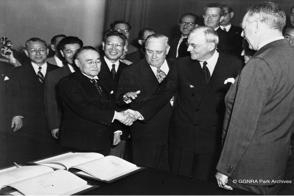
The rise of Japan, in the aftermath of World War II, from a catastrophically devastated and vanquished land to an advanced nation needs to be understood in the context of a series of domestic and international developments. Arguably, the most critical of these developments, was the formulation of ‘pacifism’, and its institutionalisation as state policy. Thrust upon Japan by the victorious Americans as a binding constitutional provision, pacifism was employed efficiently and adeptly to focus the national energies towards economic reconstruction while security was outsourced to the US. This strategy however, had its own costs. This paper has sought to analyse the historical trajectory of pacifism as policy from 1947 to 1991, contextualising and grounding it within the framework of the US-Japan Alliance. Three major conclusions are made in this paper. First, that pacifism does not have a domestic origin in Japan as it has had in the West; rather the experiences of World War II shaped Japanese receptivity to the idea, thus granting it the shroud of an enforced ideal. Second, through an assessment of four succeeding Japanese leaders since 1948, it has been posited that extant conditions outmoded any inclinations towards altering the pacifist clause. Third, it has been argued that the First Gulf War brought with it an effective end to pacifism as policy.
© 2019 ICS All rights reserved.
Powered by Matrix Nodes